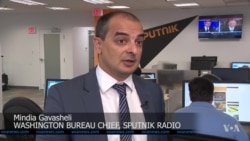Russian state-funded Sputnik Radio has started its first broadcasts in the Washington, D.C., area, in an effort to reach more Americans with what it calls "alternative news."
Sputnik, which says it gives voice to minority views outside mainstream media and supports an anti-establishment agenda, broadcasts on the 105.5 W288BS frequency.
Critics say Sputnik functions as part of a Kremlin propaganda machine aimed at undermining Western institutions.
Sputnik Radio staffers say its broadcasts into the Washington area will allow Americans in the nation's capital to listen to them and not just to what is being said about them.
"People heard a lot about us. Unfortunately, they could not really listen to us," said Sputnik bureau chief Mindia Gavasheli. "And, people who were reporting about us quite often wouldn't even bother to listen to us and present how they see us, present what we do, accurately."
Sputnik's Washington bureau opened its doors to the news media this week, in attempt to dispel what they said were misunderstandings as well as "constant attacks from U.S. corporate media."
Sputnik and other Russian state-funded media say that while they promote anti-establishment views outside mainstream media, they don't produce Kremlin propaganda.
"Since I work here, obviously I don't feel this way," Gavasheli said. "Nobody tells me what to do. We get together with our guys every day for editorial meetings, and we decide what we're gonna do, how we're gonna do, who we want to invite, and so on and so forth. No one tells us how to do that, right?"
Critics disagree
Many who study Kremlin media, like Robert Orttung, a professor of international affairs at George Washington University, disagree.
"At the end of the day, that's the purpose of these broadcasters, that's the purpose of Russian foreign policy in general, is to undermine our democracy, undermine the faith of the American people in their own institutions," Orttung said.
Sputnik fired its former White House correspondent Andrew Feinberg in May, who then became a vocal critic.
"And, it's definitely propaganda," he said of Sputnik's product. "The idea that they are being attacked by corporate media is ridiculous. They're being called out for reporting half truths and, in some cases, lies."
Sputnik rejects the comments as those of a disgruntled former employee. But, Feinberg is not the first to work for and then turn against Kremlin-funded media. A few former reporters for RT, previously known as Russia Today, quit their jobs over coverage of Russia's gay rights and its military actions in Ukraine and Syria.
Russia's state media are not the only authoritarian government outlets operating in the U.S. China's media presence is big.
"But the Russian one seems to be particularly effective because it has very high production values and it's reaching an audience of people who feel like the mainstream media has not answered what they're looking for," Orttung said.
"The only way that Russian propaganda can be effective here is when we're completely divided ourselves," he added. "And that creates an opening for them."
Russian state-funded media promote the notion that President Vladimir Putin's Russia is a benevolent and moral power simply seeking to maintain peace at home and promote a multi-polar world. They have well-qualified journalists among their ranks. But they also seem to attract a number of idealists, anti-establishment activists and conspiracy theorists.
Focus on US
For instance, Sputnik's webpage this week showed a front-page column headlined "Trump, Putin Up Against US Deep State," which argued that "the US Deep State comprising the military-intelligence nexus and their political media machine in Washington does not want to normalize relations with Russia."
The same writer, Finian Cunningham, in June wrote, "US global power depends on its presumed economic prowess and military force. With its economy in long-term decline, precipitated by the teetering dollar, the US rulers are relying increasingly on militarism to project power. That tendency is pushing the world to war."
It went on to say, "Fortunately, Russia and China may have sufficient military power to deter the desperate, waning American empire from trying to incite catastrophic war."
Sputnik disavows responsibility for such editorial comments, despite displaying them prominently.
Sputnik's shows are critical of U.S. society, politics and foreign policy, but not Russia's. Their hosts, like Fault Line's Garland Nixon — a member of the board of American Civil Liberties Union and a critic of President Donald Trump — dismiss mounting allegations in Washington concerning Russian interference in Trump's 2016 election.
"So, regardless of where it comes from and regardless of ... I remember [Iraqi] WMDs [weapons of mass destruction], so the intelligence community doesn't mean anything to me," Nixon said. "Once there's evidence, we can look at the evidence and evaluate that. But I am not going to buy into accusations, least of all from the people that they're coming from."
Co-host Lee Stranahan, a former investigative reporter with right-wing Breitbart News, also rejects concerns that Sputnik is contributing to a Kremlin campaign against the West.
"If there's ... if it's a propaganda campaign, like, what's the goal? Like, what's the goal? What's the goal? Well, it's clearly not pro-Trump, because, like I say, I'm the only pro-Trump person here," he said.
"If people want to criticize Russia, have at it," he added. "I don't ... that doesn't bother me in the least. When I've looked into it myself, Russia's not my biggest — I don't know how else to put it — Russia is not my biggest concern."
Sputnik says people should read, listen and judge for themselves whether it is "alternative news" or Kremlin propaganda.








